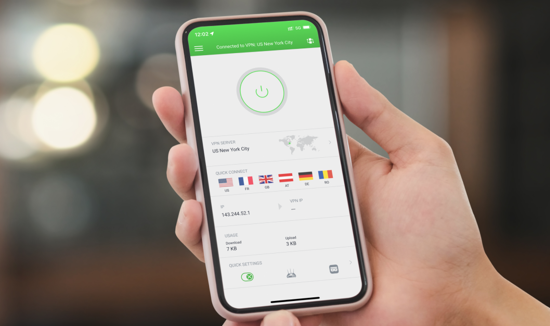Please welcome Kristin Hassel to 21st Century Blog. Kristin is an Information Systems specialist who is passionate about helping users find, utilize, and manage software. She is experienced in identity access management and strives to educate people about the importance of online security.
In her first contribution to the site, she describes how virtual private networks (VPNs), once a niche product, have become mainstream. Why? Because today’s Internet is teeming with hackers and distributors of malware hidden in innocuous files you download to your devices.
In the past few weeks, an experience with my Android mobile phone has made me aware of the value of VPNs. I suddenly was being bombarded with messages telling me my device was infected by a virus even though checking using the phone’s built-in security showed everything was fine. On my desktop system, I have installed a VPN, a firewall, and antivirus protection. But I had not done this on my phone thinking the native Google protection would be enough.
With the messages filling my phone alerts daily I decided to look on the Playstore for a legitimate tool to install and find if there was malware, a virus, or other suspicious activity. A free anti-virus application found a single infected file and successfully removed it. I then looked for a VPN I could install on my phone which I now am doing. The relevance of VPNs for all Internet-connected devices has sunk in with me. I hope when you read Kristin’s article that you will do your own investigation into using VPNs.
Before you do, however, for those of you unfamiliar with VPNs, here is a definition. A VPN is an online service that encrypts your Internet traffic and routes it through a server in a different location to protect you from third parties that may want to see what you are doing. VPNs can help you access region-restricted content, bypass censorship, and protect privacy online. For people living in Russia, China, and other countries where Internet policing restricts access, VPNs are a must.
Virtual Private Networks (VPNs) used to be a niche product used by large corporations. It wasn’t until the late 1990s that home users became more interested in securing their data and internet connections.
End-to-end network security has been the end goal for all internet connections since 1993 when John Ioannidis and Matt Blaze created the first swipe protocol. Swipe never made it past the beta stages, but it did put network security protocols and the need for secure connections on the map.
In 1995, a section of the Internet Engineering Task Force (IETF) called the Internet Protocol Security (IPSec) Work Group began grouping multiple protocols under the title IPSec. This was crucial to the development of VPNs, as all VPNs currently on the market must support IPSec in some form. It’s the most supported protocol for software and hardware networking solutions.
A year later, Microsoft created Point-to-Point Tunneling Protocol (PPTP) which required only the location of the server (IP address) and the correct credentials to provide a secure network connection. PPTP marked a turning point for developing advanced VPN solutions, making it possible to establish encrypted tunnels over public networks. The protocol later fell out of favour after whistle-blower Edward Snowden revealed that the US National Security Administration (NSA) could decrypt data sent over PPTP.
The most popular VPN tunnelling protocols used now are OpenVPN, WireGuard, Internet Key Exchange version 2(IKEv2), Layer 2 Tunneling Protocol (L2TP), and Secure Socket Tunneling Protocol (SSTP). In addition, many VPNs provide military-grade 256-bit AES or 128-bit AES, two currently unbreakable forms of encryption that make it impossible for cybercriminals to use your online data even if they manage to intercept it.
As the internet has evolved and revelations about governments spying on their citizens increased, VPNs have evolved to cater to everything from business owners to the everyday internet user looking to increase the privacy and security of their connection. Today, 1.6+ billion people worldwide have a VPN on at least one personal device.
The four most common types of VPN are personal, remote access, site-to-site, and extranet-based site-to-site. A personal VPN is used for home or personal use and includes services like PIA VPN. The client is installed directly to the user’s device enabling them to connect to the VPN’s network via a chosen server.
Remote access VPNs work much in the same way but instead of connecting to the VPN network when you choose a server, it connects you to a private network, like your work network. This allows users to use business resources and communicate with coworkers over the company network while travelling or working remotely.
Larger interconnected facilities like hospitals and colleges often use a site-to-site VPN. This type of VPN is configured on network devices and secures a connection between multiple networks. An extranet-based site-to-site VPN is configured like a standard site-to-site VPN but secures connections between multiple organizations’ internal networks. This makes it popular for seller/distributor or partner/supplier applications.
Though VPNs are often mistaken for being interchangeable with anti-virus solutions, the two perform different functions. Anti-virus helps to prevent damage to your device by scanning for, blocking, and isolating malware like viruses. A VPN improves the security and privacy of your internet connection.
Occasionally, VPNs include a built-in ad, malware, and tracker blocker or provide an optional anti-virus add-on for a small additional fee. In general, however, a VPN is not a replacement for anti-virus protection. If your VPN doesn’t include or offer these features, you’ll still need some form of anti-virus.
The development of dedicated apps with guided user interfaces (GUIs) made it easier for beginners to use a VPN, as it removed manual configurations via the command line or existing system software like Windows VPN. You can use a VPN on desktop devices, smartphones, smart TVs, consoles, routers, and more. Streaming is a close second to security as the main reason most people use a VPN (it allows users to access their streaming accounts while travelling).
Instead of just providing local servers in the user’s home country or connecting networks in specific cities, VPN users can now enjoy a network of global servers. Likewise, businesses can use a VPN to give remote users access to their network from anywhere in the world. Currently, roughly 96% of VPN providers have servers on six continents. Providing increased online anonymity anywhere their users travel.
Corporate and small business VPN prices vary by the number of users, devices, and other factors including any added features or customizations a company needs. Personal VPN prices can range from free to as high as US $13 a month, though the average cost is around $6.50. Long-term subscriptions will generally provide even more affordable prices. For example, Private Internet Access (PIA) VPN, offers a 2-year plan for $2.19 per month with an additional two months free. Options like this give personal VPN users affordable online privacy protection.
Still, it’s estimated that around half of all VPN users choose a free VPN over a paid one. This may be detrimental to their online privacy as several free VPNs have had major security breaches. Considering one study found that 80% of respondents use a VPN specifically for increased security, a free VPN may not be the best option.
What started as a simple tool to secure network connections for corporations has become an everyday necessity due to the massive increase in cybercrime and the advent of the dark web. There’s no doubt that as the Internet continues to evolve and cyber threats become even more prominent, VPNs will keep evolving to counter bad web actors.









